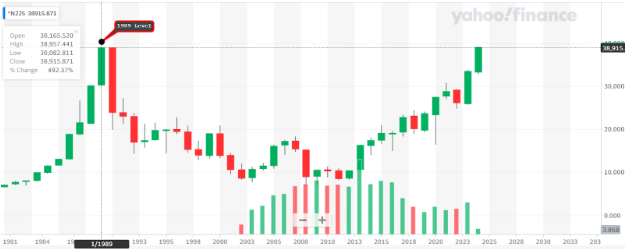
Japan’s Nikkei 225 index achieved a significant milestone on Thursday, surpassing the record it set in 1989 before the burst of its financial bubble. The index closed at 39,098.68, up 2.2%, marking a remarkable resurgence after years of stagnation.
Following its peak in 1989, the Nikkei 225 endured a prolonged period of decline, exacerbated by the 2011 triple disasters that hit Japan. However, recent months have seen a remarkable turnaround, with the index logging sharp gains.

Source: yahoofinance
Foreign investors have played a crucial role in driving the Nikkei’s rally, accounting for the majority of trading volume on the Tokyo exchange. Unlike the US, where record highs are driven by hopes of interest rate cuts, Japan has maintained a benchmark rate of minus 0.1% for over a decade.
The recent news of Japan slipping into recession has led to expectations that the Bank of Japan will maintain its easy money policies to spur inflation and economic growth. This has injected optimism into the market and fueled further investment.
Global investors have also been shifting their focus away from China, with concerns over its slowing economy and geopolitical tensions. This has further boosted investment in Japanese stocks, contributing to the Nikkei’s gains.
Know: China Slashes Key Mortgage Rate To Fuel Growth
Record gains in corporate earnings and improved corporate governance have enhanced the appeal of Japanese stocks. Despite the trauma of the early 1990s bubble burst, younger investors are showing more willingness to invest in shares.
The Government Pension Investment Fund, one of the world’s largest institutional investors, has increased its investments in stocks, contributing to the market’s upward trajectory. Additionally, the yen’s weakness against the US dollar has made Japanese stocks more attractive to foreign investors.
Experts believe that Japan’s shares are not overpriced, with the price-to-earnings ratio for the Tokyo market at about 16, compared to 23 for the S&P 500. In 2023, investors in Tokyo shares earned a return of more than 28%, indicating the market’s strong performance.
Read: Nikkei 225 at a potential turning point
Japan’s Nikkei 225’s surge past its 1989 record reflects a significant turnaround for the index, driven by a combination of factors including foreign investor interest, Bank of Japan’s policy, and corporate performance.
Disclaimer: This blog has been written exclusively for educational purposes. The securities mentioned are only examples and not recommendations. It is based on several secondary sources on the internet and is subject to changes. Please consult an expert before making related decisions.
Published on: Feb 22, 2024, 4:25 PM IST
We're Live on WhatsApp! Join our channel for market insights & updates
